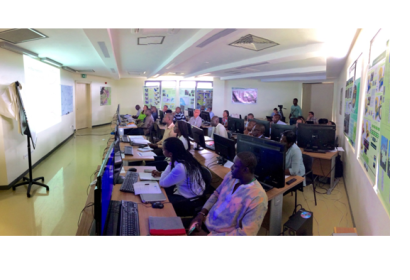The 3rd Synthetic aperture radar (SAR) workshop - coordinated by the CEOS Working Group on Capacity Development and Data Democracy (WGCapD), supported by UNOOSA through its UN-SPIDER Programme, the European Commission (Copernicus Programme) and ESA, and hosted by Gabonese Space Agency (AGEOS) - took place in Libreville, Gabon, between 20 and 24 February. The aim of this and two previous such workshops is to build specific capacity and a good understanding of how to process and analyze SAR imagery for participants in West Africa, East Africa and SADC countries.
Other organizations that also made a significant contribution to the success of the Gabon workshop by providing SAR experts to conduct specific lectures and hands-on training are NASA, the German Aerospace Agency (DLR), the SAREDU initiative and the University of Marne-la-Vallee in France.
The main objective is to build SAR utilisation capacity in the region and inform of the various SAR satellite data sources and data availability, as a needed addition to optical remote sensing training activities already offered, given also the difficulty of collecting good optical satellite imagery data over large parts of Africa because of the cloud cover conditions.
Synthetic aperture radar (SAR) is an active form of remote sensing that does not rely on the sun to acquire images. It has applications that are cutting across different disciplines from disaster management, weather monitoring and to maritime surveillance to name but a few. The participants in the workshop learned about some of the different SAR applications such as for ship detection, oil spills detection, tracking illegal fishing, land cover mapping, agriculture, flood mapping, biomass & forestry. They also learned about the role of international mechanisms established by the United Nations or by space agencies to support use of space technologies in various domains, and were given detailed briefings on the UN-SPIDER Programme and its facilitation possibilities.
The workshop was attended by 17 participants from Rwanda, Cote d'Ivoire, Senegal, Tunisia, Morocco, Kenya, Ghana, Nigeria and Gabon, opening up new opportunities and possibilities for utilization of SAR technology for the participants and their institutions, be it in the disaster management, environmental or food and water security domains.

